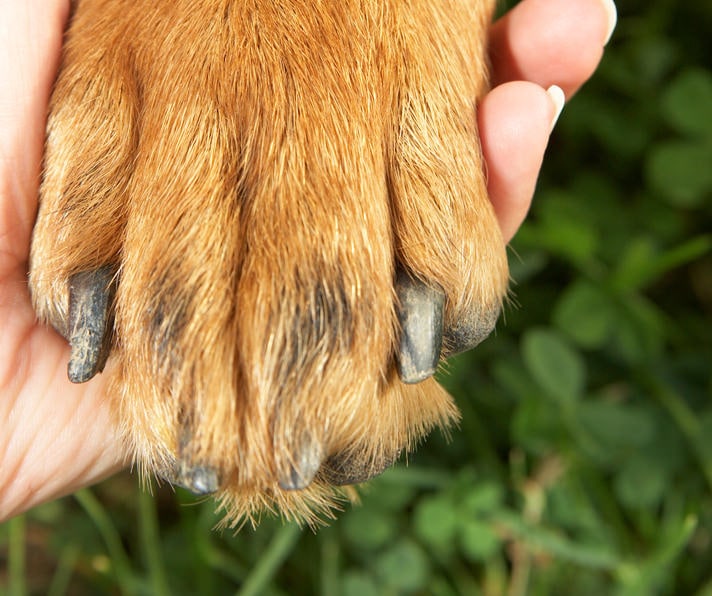We all feel the need to scratch an occasional itch, and our dogs are no different. Chronic scratching in dogs, however, may indicate an underlying medical or behavioral condition. Left untreated, the itchiness can intensify, causing even more discomfort and possibly creating a new set of health problems.
Fortunately, there are a number of solutions available to stop your pup from scratching herself while providing her with much-needed relief.
Why You Need to Address Your Dog’s Scratching

All dogs scratch occasionally, but excessive scratching can lead to serious medical problems, including infection.
“Scratching breaks down the healthy skin barrier. This allows bacteria, yeast, and parasites to penetrate and flourish. It also dries out the skin which makes it even more itchy. So they get even more infections and often need even more expensive treatments if you let it wait,” says Dr. Jason Sweitzer, a veterinarian at Conejo Valley Veterinary Hospital in Thousand Oaks, California.
Chronic scratching can also lead to hair loss and thickening of the skin, says Dr. Christine Cain, an assistant professor at the University of Pennsylvania School of Veterinary Medicine. And as a pet parent, the scratching is no doubt hard on you, too.
“From a human standpoint, scratching is nearly intolerable. The sound of dog tags jangling at all hours is disruptive [and] it is difficult to see a dog in the level of distress that is typically indicated by chronic scratching,” says Dr. Liz Stelow, chief of service at the Veterinary Medical Teaching Hospital at University of California, Davis.
Scratching in dogs can be caused by a number of conditions, including parasites, skin infections, allergies and tumors. Though not as common, behavioral issues may also be at the root of your dog’s scratching.
Start at the Vet
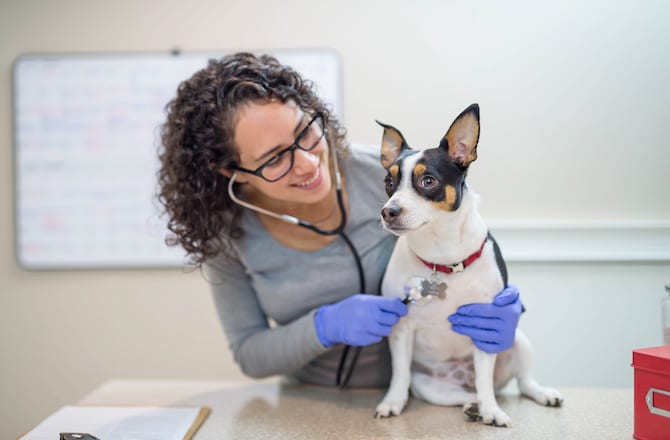
Your vet is best qualified to correctly diagnose and treat the source of your dog’s scratching and monitor any secondary conditions that may arise.
“If the scratching has resulted in a secondary skin infection, oral antibiotics and/or antifungals may be needed. In the case of mange, medications such as ivermectin or medicated dips are used,” says Dr. Susan Jeffrey, a veterinarian at Truesdell Animal Care Hospital in Madison, Wisconsin.
Vets look for signs of parasites, skin infections, or allergic skin disease that could be causing itch, says Cain, who is board-certified in veterinary dermatology. This may include a step-by-step work-up to rule out causes and determine the source of the itch.
Don’t Forget to Use Preventions
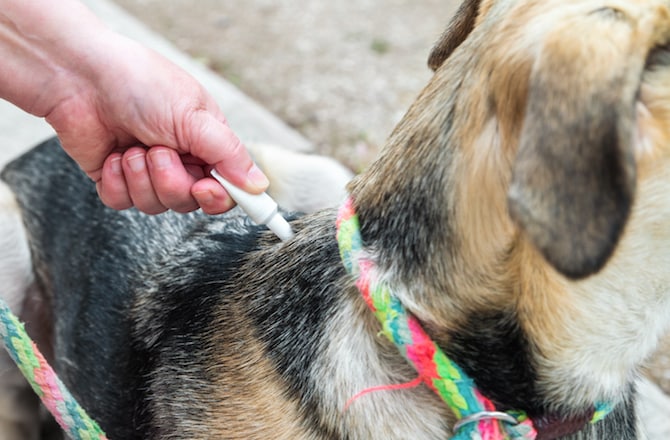
Flea bites are a major source of itch, making flea and tick prevention a mainstay of your dog’s care regimen.
“At a minimum, owners should have (and use) a quality flea treatment year-round, even if they never see a flea. Fleas live in all climates. They usually jump on to feed and jump off before we ever see them,” says Stelow.
Not all flea preventives are created equally, however. Some veterinarians recommend opting for vet-prescribed or recommended solutions over handmade ones. Also, be sure to purchase preventives made specifically for dogs.
Tackle Boredom

Constant scratching may also be a sign of a behavior-based issue, says Jeffrey.
“If the root of the itching is behavioral, additional mental stimulation for the dog may be needed. This may be taking your dog for walks more often or having it spend time at a dog daycare instead of being alone,” she says. “Enrichment is key for helping keep these dogs happy and to help prevent them from scratching/licking excessively.”
Your vet or a certified dog trainer can determine if boredom, or another behavioral problem, is behind your dog’s scratching.
Offer a Skin-Soothing Bath
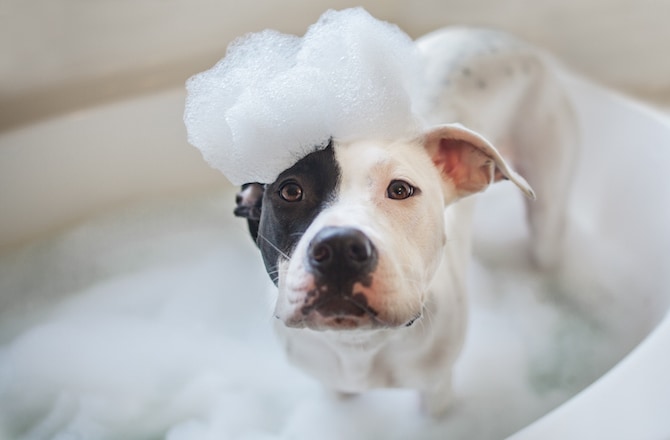
The itchier your dog gets, the more she’ll want to scratch herself, so providing relief is essential. Baths are an excellent option to alleviate her pain.
“If an owner is looking for a gentle shampoo for a dog without a skin infection, I recommend getting an oatmeal-based pet shampoo with no scent. Do not use baby or human shampoos as they can be too drying,” Jeffrey says.
For more serious issues, you may need to use something stronger than oatmeal. “Many times medicated baths are needed to help restore and maintain the protective skin barrier,” says Jeffrey.
Medicated shampoos are only available through vets, she says, and usually contain antiseptic and antifungal ingredients.
Sweitzer says that prescription shampoos are safe for daily use and can help maintain your dog’s coat by washing off allergens and decreasing the amount of bacteria on the coat. Talk to your veterinarian about appropriate shampoo and bathing regimens for your specific situation.
Consider Medication
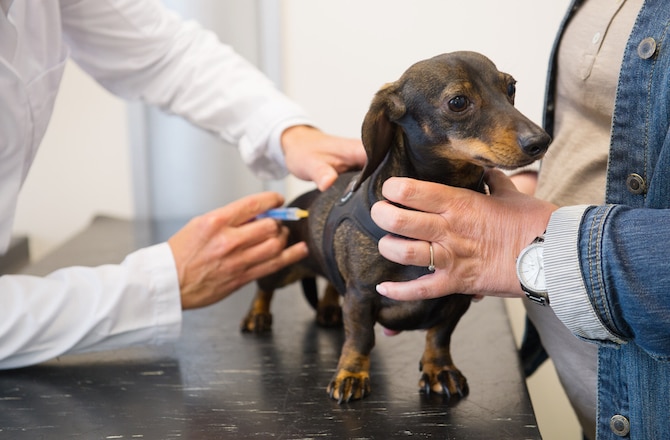
Dogs with environmental allergies can sometimes benefit from antihistamines, says Jeffrey, but medication made specifically for pets may also be required to give your dog relief. “There are even allergy injections and oral allergy drops, referred to as immunotherapy, that can be used to help comfort dogs with environmental allergies,” she says.
Antihistamines are available over the counter, but the others have to be prescribed by a vet, she says. Before giving your dog over-the-counter treatments, discuss the medication and dosage with your vet.
Re-Examine Your Dog’s Diet
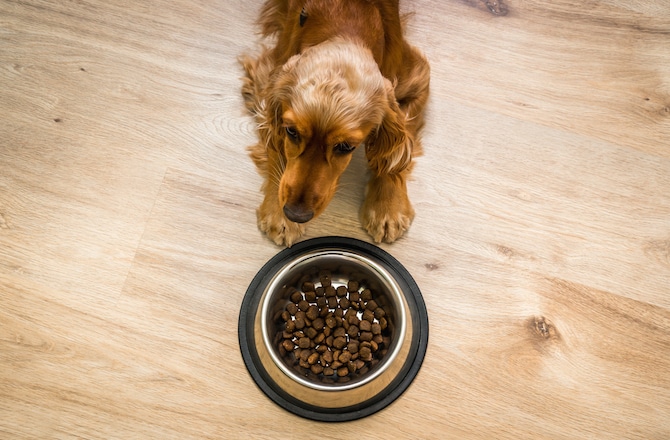
Don’t underestimate the role nutrition plays in your dog’s itchiness. Supplementing your dog’s diet with omega-3 fatty acids can benefit her itchy, irritated skin.
“Omega 3 fatty acids are found to have anti-inflammatory properties. This helps the skin indirectly because it’s the inflammation that can lead to itchiness and that leads to more inflammation,” says Jeffrey.
Consider giving your dog fish oil dog supplements made specifically for pets, or consider a hypoallergenic diet (available only from vets) that can help a dog with food allergies, and keep them comfortable, she says.
“They’re made so that the protein source is broken down into such small pieces that the immune system of the dog doesn’t recognize the proteins,” she says. “When the immune system isn’t reacting to the proteins to which the dog is sensitive, then the dog isn’t itchy.”

Paula Fitzsimmons is a freelance writer and researcher specializing in companion animal health and nutrition, and science. She’s written for clients like Prevention magazine, PetMD.com, PawCulture.com, Parrots magazine, and University of Texas-Arlington. She lives in Madison, Wisconsin with her husband and feathered family members, including parrots Whit and Sweetpea.
Share:






